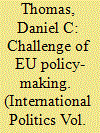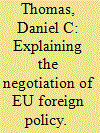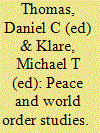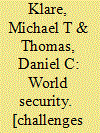| Srl | Item |
| 1 |
ID:
088472


|
|
|
|
|
| Publication |
2009.
|
| Summary/Abstract |
This paper presents the special issue as a systematic attempt to understand why and when Member States succeed or fail in negotiating common policies for the world stage. It highlights the European Union's (EU's) lack of automatic unity in world affairs, and focuses on the process by which Member States negotiate their differences in the quest for common policies. The subject and conclusions of the various case studies are presented
|
|
|
|
|
|
|
|
|
|
|
|
|
|
|
|
| 2 |
ID:
088473


|
|
|
|
|
| Publication |
2009.
|
| Summary/Abstract |
Despite the vast literature on the development of EU foreign policy institutions and the EU's growing experience as an international actor, relatively little effort has been made to explain the often-contentious negotiations among Member States that determine whether or not a common policy is adopted, and if so, what it will be. This paper proposes a Normative Institutionalist theory of intra-EU negotiations on foreign policy and external relations, including hypotheses that explain policy outcomes in terms of entrapment and cooperative bargaining dynamics. It compares these hypotheses' causal mechanisms and observable implications to those of hypotheses derived from Intergovernmentalism as well as theories of Social Learning and Normative Suasion.
|
|
|
|
|
|
|
|
|
|
|
|
|
|
|
|
| 3 |
ID:
088481


|
|
|
|
|
| Publication |
2009.
|
| Summary/Abstract |
Normative Institutionalism has proven to be a robust theory of EU decision-making on foreign policy and external relations whose entrapment and cooperative bargaining explanations for the policy-making process and outcome are generally (though not universally) superior to those of competing theories. This conclusion emerges from 14 case studies across a broad range of policy areas and institutional settings, all of which exhibited clear differences in the initial policy preferences of member states. Only two of the cases offered clear support for Intergovernmentalism's competitive bargaining hypothesis, while none of the case studies conforms to either the normative suasion or policy learning hypotheses, which posit distinctive mechanisms of policy agreement based on preference convergence. Cross-case analysis identifies the relative importance of five conditions hypothesized to affect the likelihood of entrapment and cooperative bargaining: determinacy, relevance, publicity, precedent and forum. Finally, we discuss the implications of this special issue for future research and for EU policy-making
|
|
|
|
|
|
|
|
|
|
|
|
|
|
|
|
| 4 |
ID:
033957


|
|
|
|
|
| Edition |
5th ed.
|
| Publication |
Boulder, Westview Press, 1989.
|
| Description |
xviii, 660p.
|
| Standard Number |
0813307309
|
|
|
|
|
|
|
|
|
|
|
|
Copies: C:1/I:0,R:0,Q:0
Circulation
| Accession# | Call# | Current Location | Status | Policy | Location |
| 031102 | 321.17207/THO 031102 | Main | On Shelf | General | |
|
|
|
|
| 5 |
ID:
088475


|
|
|
|
|
| Publication |
2009.
|
| Summary/Abstract |
Achieving European Union (EU) unity in world affairs is particularly difficult when divergent Member State preferences are reinforced by US pressure. This paper explains how the EU maintained unity on the International Criminal Court (ICC) despite a concerted American effort in 2002 to exploit intra-EU discord on the issue of agreements to shield citizens from certain states from ICC scrutiny. Some Member States were sympathetic to American efforts to shield US personnel from the ICC, while others considered them incompatible with the EU's prior commitment to support the new Court. By comparing the process and outcome of two sets of negotiations on this issue, one within the UN Security Council and one within EU forums, the paper suggests that the likelihood of EU policy outcomes being shaped by prior normative commitments and cooperative bargaining (as expected by Normative Institutionalism) rather than competitive bargaining (Intergovernmentalism) depends significantly upon the institutional context in which the Member States negotiate.
|
|
|
|
|
|
|
|
|
|
|
|
|
|
|
|
| 6 |
ID:
005639


|
|
|
|
|
| Publication |
New York, St. Martin's Pr., 1994.
|
| Description |
v, 408p.
|
| Standard Number |
0312085842
|
|
|
|
|
|
|
|
|
|
|
|
Copies: C:1/I:0,R:0,Q:0
Circulation
| Accession# | Call# | Current Location | Status | Policy | Location |
| 036067 | 327.12/KLA 036067 | Main | On Shelf | General | |
|
|
|
|